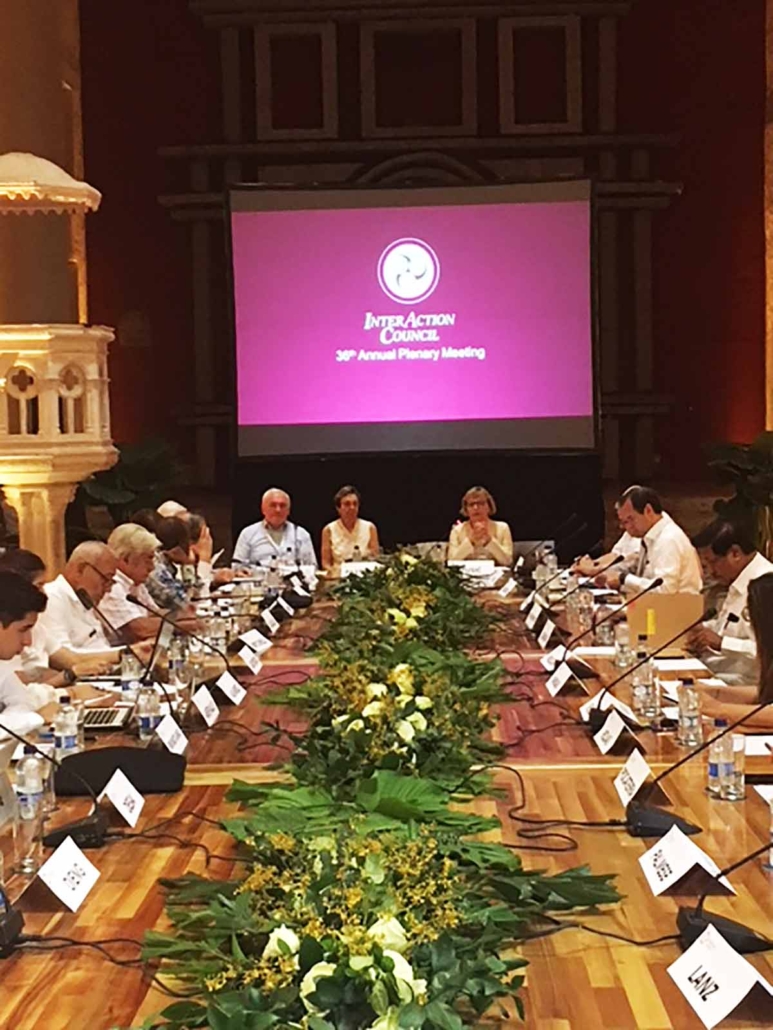Remarks to the Opening Ceremony 36th Annual Plenary Meeting of the InterAction Council
Cartagena Columbia – 15 May 2019
Closing Remarks
H.E. Bertie Ahern
Your Excellencies, Distinguished Participants, Ladies, and Gentlemen.
Dear Andrés,
Thank you for your thoughtful remarks. Your speech really struck a note with me. I, too, come from a country that was deeply affected by conflict and terrorism. In Ireland, we achieved peace by bringing everyone to the table and by emphasizing cooperation.
I mention this because cooperation is key to achieving peace, eradicating terrorism, and to be honest: it is the key to building better societies.
But reading the news today you get the feeling that cooperation has become a dirty word. Ten, fifteen years ago globalization was at the heart of everything. All our policies, strategies and plans were based on multilateralism and international cooperation. We built new international institutions and strengthened the ones we already had in place.
But now – in a time when we are more connected than ever – multilateralism is more threatened than ever. It’s a strange discrepancy – that at a time when we have the opportunity to build a better international world order – there are so many who want to dismantle it.
Currently, the Trump administration is perhaps one of the biggest threats to multilateralism. Beyond what President Trump may tweet, his administration drives policies that will impact generations to come. Withdrawing from the Paris climate accord; pulling out of the UN Human Rights Council; banning the Prosecutor of the International Criminal Court to travel to the USA; leaving UNESCO … – these are just a few examples of Trump’s policies.
Of course, Trump is not alone. He has accomplices across the world: Viktor Orban in Hungary, Marine Le Pen in France, Erdogan in Turkey, Bolsonaro in Brazil, the Brexiteers in the UK…the list goes on…
Their voters are suspicious of the international system, which to them seems distant and removed from their daily lives. Instead of making an effort in explaining the benefits of cooperation, populists are exploiting the situation for political gains. And quite frankly, they are short-term political gains without a long-term vision.
Just look at Brexit. The Leave campaign focused on marginal issues such as health care and completely ignored the issues that are now at the heart of the Brexit negotiations: free movement, trade, peace in Northern Ireland.
My question is – how will the populist anti-globalization leaders resolve cross-border challenges without the international system? Climate change, pollution, mass migration, and pandemics…these are issues that do not know borders. Issues that states cannot solve alone. Turning your back on the international system is like hiding your head in the sand like an ostrich and hoping that the threats will go away on their own.
But that is not the right way to govern. Charles Darwin once said that “It is the long history of humankind (and animal kind, too) that those who learned to collaborate and improvise most effectively have prevailed.”. The ones who cooperate prevail. Wise words.
Dear friends.
We are here because we believe in a multilateral world order. It is one of the core values of the InterAction Council and one of the reasons this Council was founded. Over the years we have worked on how to strengthen the international order. Now we must defend it.
I believe we need to help communities and voters understand the benefits of international institutions in their daily lives. It is true that international institutions may appear distant and disconnected from our daily lives. But the fact that something is distant does not make it obsolete. As President Macron recently said, the United Nations is essential for our daily life. This applies to the international system as a whole.
Beyond the more obvious tasks such as keeping the peace, preventing conflicts and providing humanitarian aid the United Nations and its agencies impact our daily lives. The World Health Organization has helped contain pandemics such as Ebola; the International Labour Organization has ensured that we all have rights as workers, and the International Civil Aviation Organization regulates international air travel.
In fact, all of us who had to travel from abroad to come to Colombia were benefiting from international cooperation. There are international conventions in place to govern commercial air travel, to define passports, and harmonize customs procedures. This is just a small example of how much of our daily life is actually governed and made easier by international institutions.
So the international system is far from distant in our daily lives. We are just so used to it that it has become invisible. We cannot see the forest for the trees.
What we, as the InterAction Council should do – and what we should recommend to current leaders and international organizations – is to try to make the multilateral system more visible and raise awareness of its importance. We should also work on strengthening and improving the international system to make it more inclusive, democratic, and more visible in local communities. However, opening up a system to amendments during a time when it is under attacks from left and right is not the right way forward. First, we must build trust and get voters and populations back on board with it.
Dear friends.
As always, it is a pleasure to see you again. We have an exciting agenda ahead of us and I look forward to working with you. I’m also delighted to see young leaders* here with us and I look forward to hearing from you.
Thank you.
(*we are partnering with One Young World who have sent some young leaders to take part in the sessions).



